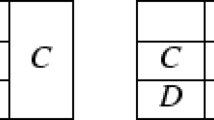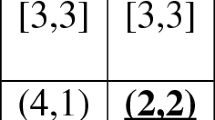Abstract
Nash equilibrium is based on the idea that a strategy profile is stable if no player can benefit from a unilateral deviation. We observe that some locally rational deviations in a strategic form game may not be profitable anymore if one takes into account the possibility of further deviations by the other players. As a solution, we propose the concept of farsighted pre-equilibrium, which takes into account only deviations that do not lead to a decrease of the player’s outcome even if some other deviations follow. While Nash equilibria are taken to include plays that are certainly rational, our pre-equilibrium is supposed to rule out plays that are certainly irrational. We prove that positional strategies are sufficient to define the concept, study its computational complexity, and show that pre-equilibria correspond to subgame-perfect Nash equilibria in a meta-game obtained by using the original payoff matrix as arena and the deviations as moves.
This work was supported by the FNR (National Research Fund) Luxembourg under projects S-GAMES, C08/IS/03 and GMASec, PHD/09/082.
Access this chapter
Tax calculation will be finalised at checkout
Purchases are for personal use only
Preview
Unable to display preview. Download preview PDF.
Similar content being viewed by others
References
Osborne, M., Rubinstein, A.: A Course in Game Theory. MIT Press (1994)
von Neumann, J., Morgenstern, O.: Theory of Games and Economic Behaviour. Princeton University Press, Princeton (1944)
Harsanyi, J.: Interpretation of stable sets and a proposed alternative definition. Management Science 20, 1472–1495 (1974)
Chwe, M.: Farsighted coalitional stability. Journal of Economic Theory 63, 299–325 (1994)
Suzuki, A., Muto, S.: Farsighted stability in an n-person prisoners dilemma. International Journal of Game Theory 33, 431–445 (2005)
Nakanishi, N.: Purely noncooperative farsighted stable set in an n-player Prisoners Dilemma. Technical Report 707, Kobe University (2007)
Mailath, G., Samuelson, L.: Repeated Games and Reputations: Long-Run Relationships. Oxford University Press (2006)
Greenberg, J.: The theory of social situations: an alternative game-theoretic approach. Cambridge University Press (1990)
Diamantoudi, E., Xue, L.: Farsighted stability in hedonic games. Social Choice and Welfare 21, 39–61 (2003)
Halpern, J.Y., Rong, N.: Cooperative equilibrium. In: International Conference on Autonomous Agents and Multi Agent Systems, pp. 1465–1466 (2010)
Dung, P.M.: On the acceptability of arguments and its fundamental role in nonmonotonic reasoning, logic programming and n-person games. Artificial Intelligence 77, 321–357 (1995)
Author information
Authors and Affiliations
Editor information
Editors and Affiliations
Rights and permissions
Copyright information
© 2011 Springer-Verlag Berlin Heidelberg
About this paper
Cite this paper
Jamroga, W., Melissen, M. (2011). Doubtful Deviations and Farsighted Play. In: Antunes, L., Pinto, H.S. (eds) Progress in Artificial Intelligence. EPIA 2011. Lecture Notes in Computer Science(), vol 7026. Springer, Berlin, Heidelberg. https://doi.org/10.1007/978-3-642-24769-9_37
Download citation
DOI: https://doi.org/10.1007/978-3-642-24769-9_37
Publisher Name: Springer, Berlin, Heidelberg
Print ISBN: 978-3-642-24768-2
Online ISBN: 978-3-642-24769-9
eBook Packages: Computer ScienceComputer Science (R0)




